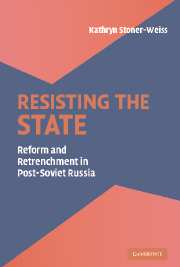Book contents
- Frontmatter
- Contents
- Acknowledgments
- Note on Transliteration
- Resisting the State
- 1 W(h)ither the Russian State?
- 2 Apparatchiki into “Entrepreneurchiki”: The Sources of Russia's Weak Central State
- 3 Governing Russia: Patterns of Regional Resistance to the Central State
- 4 Inside the Russian State: Assessing Infrastructural Power in the Provinces
- 5 Retrenchment over Reform: Obstacles to the Central State in the Periphery
- 6 Weak National Parties, Weak Central State
- 7 The Comparative Implications of Russia's Weak State Syndrome
- Index
5 - Retrenchment over Reform: Obstacles to the Central State in the Periphery
Published online by Cambridge University Press: 25 July 2009
- Frontmatter
- Contents
- Acknowledgments
- Note on Transliteration
- Resisting the State
- 1 W(h)ither the Russian State?
- 2 Apparatchiki into “Entrepreneurchiki”: The Sources of Russia's Weak Central State
- 3 Governing Russia: Patterns of Regional Resistance to the Central State
- 4 Inside the Russian State: Assessing Infrastructural Power in the Provinces
- 5 Retrenchment over Reform: Obstacles to the Central State in the Periphery
- 6 Weak National Parties, Weak Central State
- 7 The Comparative Implications of Russia's Weak State Syndrome
- Index
Summary
This chapter explains the patterns of noncompliance and eroding central state infrastructural capacity in the provinces through the 1990s that were established in Chapters 3 and 4 and to which President Putin so strongly reacted by the end of 2004 (described in detail in Chapter 7). In presenting this explanation, I build empirically on the theoretical argument presented in Chapter 2 regarding the negative effect on central state capacity of the collusive relationship between regional government actors and enterprise directors.
I begin, though, by discussing contending arguments regarding how the central state exercised its authority in the provinces in the past, including a discussion of the strengths and weaknesses of mechanisms of Russian fiscal federalism and strategies on the part of the federal government to deal with regions bilaterally in an effort to “divide and conquer” them politically.
I argue that none of these responses to regional resistance actually struck at the core of the problem – the business–regional government nexus. The persistence of regional compliance documented in Chapter 3 and the responses from policy actors that are presented in Chapter 4 indicate that instruments like withholding transfer payments or subsidies and subventions to errant provinces or signing bilateral treaties with some regions but not others turned out to be blunt weapons in the battle to gain better implementation of federal policy more generally.
- Type
- Chapter
- Information
- Resisting the StateReform and Retrenchment in Post-Soviet Russia, pp. 98 - 110Publisher: Cambridge University PressPrint publication year: 2006



